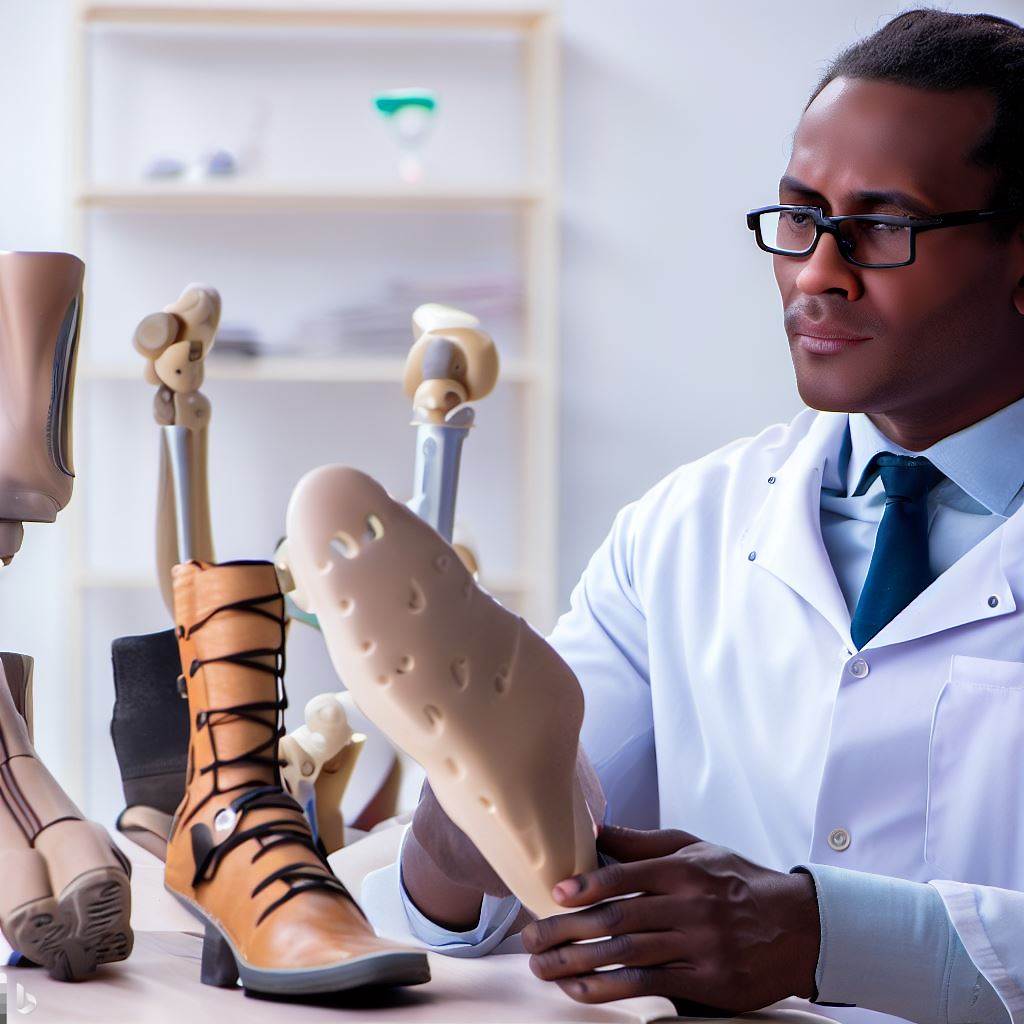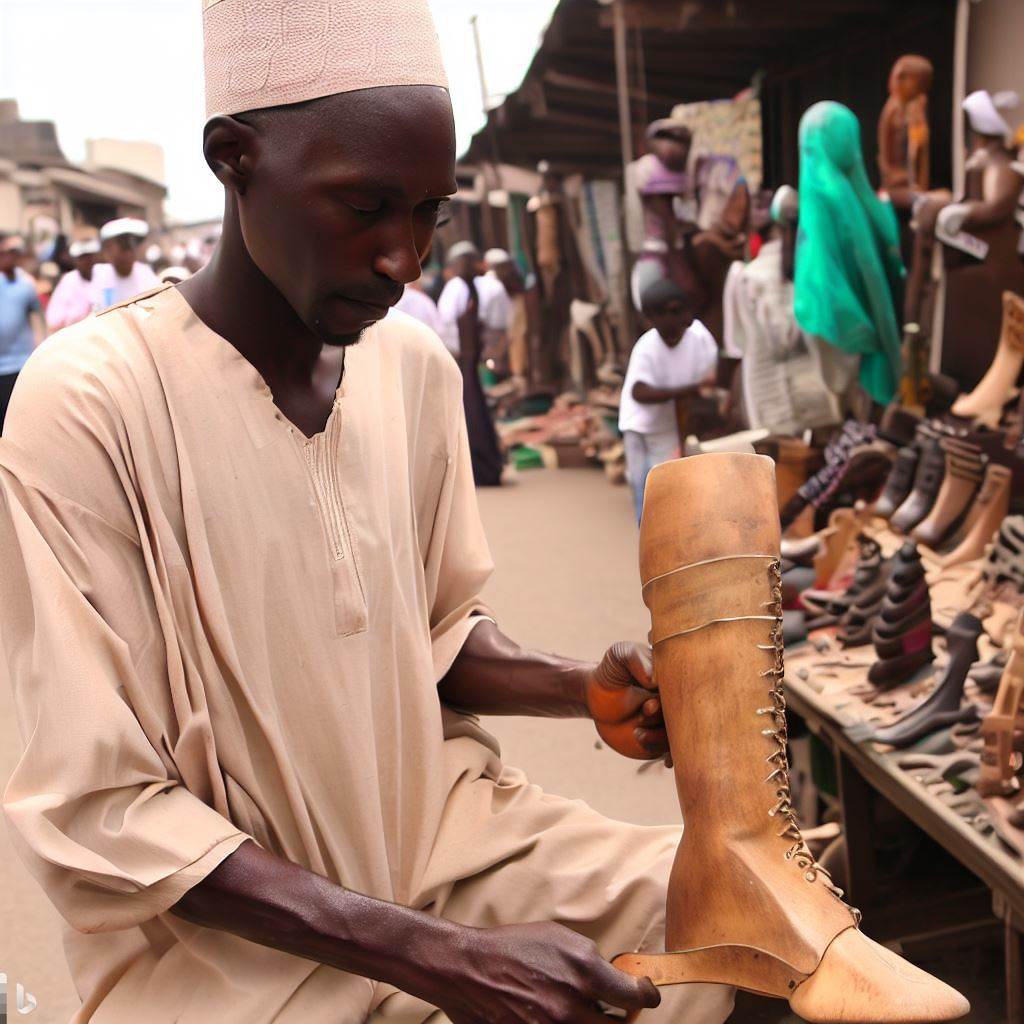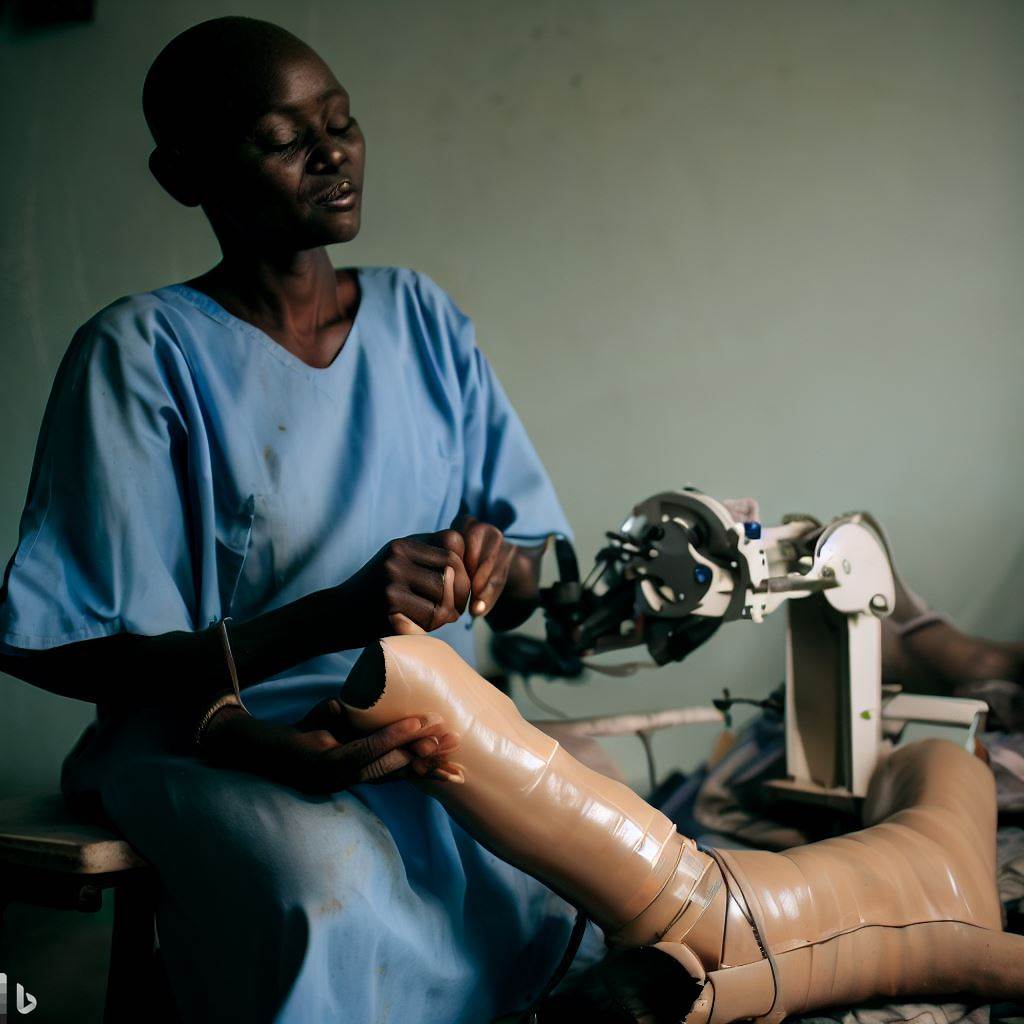Introduction
A Prosthetist/Orthotist is a specialized healthcare professional focused on designing and fitting prosthetics and orthotics, essential for enhancing mobility and functionality in individuals with limb deficiencies or physical impairments.
This crucial role in healthcare is gaining prominence in Nigeria due to a rise in accidents, birth defects, and conditions requiring prosthetic or orthotic interventions.
To become a Prosthetist/Orthotist in Nigeria, aspiring professionals must pursue specific educational pathways.
Typically, this involves completing a Bachelor’s degree in Prosthetics and Orthotics from a recognized institution.
This program equips students with the necessary knowledge and practical skills to assess patients, design personalized solutions, and provide fitting and adjustment services.
Once qualified, Prosthetist/Orthotist professionals can find employment in hospitals, rehabilitation centers, or private practices.
They work closely with patients, doctors, and therapists to ensure the most effective and comfortable solutions are provided.
As the demand for prosthetic and orthotic interventions continues to grow, pursuing a career in Prosthetics and Orthotics offers an opportunity to make a meaningful impact on the lives of individuals in Nigeria facing mobility challenges.
Educational Requirements
When aspiring to become a Prosthetist/Orthotist in Nigeria, it is important to meet certain educational requirements.
These qualifications ensure that individuals are equipped with the necessary knowledge and skills to excel in the field.
Discuss the necessary educational qualifications
To pursue a career in Prosthetics & Orthotics, a Bachelor’s degree in the field is required.
This degree program provides individuals with a comprehensive understanding of prosthetic and orthotic devices. It covers essential topics such as biomechanics, rehabilitation sciences, and orthopedics.
Moreover, aspiring Prosthetist/Orthotists in Nigeria should consider enrolling in accredited institutions that offer the Prosthetics & Orthotics program.
These institutions provide a structured curriculum and ensure that students receive high-quality education.
Some of the recognized institutions in Nigeria that offer this program include the University of Lagos, Ahmadu Bello University, and the University of Nigeria, Enugu Campus.
Highlight the importance of specialized education in the field
Specialized education plays a crucial role in shaping the future Prosthetist/Orthotists in Nigeria. It equips individuals with the necessary knowledge and skills to excel in their profession.
Here are some reasons why specialized education is important:
- Acquisition of knowledge and skills: Specialized education allows individuals to gain a deep understanding of prosthetic and orthotic principles, techniques, and materials.
It provides them with the necessary skills to assess patients, design and fabricate custom devices, and provide rehabilitation services. - Understanding human anatomy and physiology: Prosthetist/Orthotists work closely with patients, creating devices that compensate for physical disabilities. Therefore, having a comprehensive understanding of human anatomy and physiology is essential.
Specialized education ensures that individuals possess the knowledge to assess patients’ needs accurately and design appropriate solutions.
Generally, obtaining a Bachelor’s degree in Prosthetics & Orthotics and attending accredited institutions are essential steps to become a Prosthetist/Orthotist in Nigeria.
Specialized education equips individuals with the necessary knowledge and skills to excel in the field, including a deep understanding of human anatomy and physiology.
By meeting these educational requirements, aspiring Prosthetist/Orthotists are better prepared to contribute to the healthcare system and improve the lives of individuals with physical disabilities.
Read: Top Institutions to Study Phlebotomy in Nigeria
Practical Training
The Need for Practical Training
Becoming a Prosthetist Orthotist in Nigeria requires the recognition of the vital role practical training plays in applying theoretical knowledge and developing practical skills.
Practical training is indispensable as it bridges the gap between classroom learning and real-world applications.
Common Avenues for Practical Training
Internships and clinical rotations offer valuable avenues for gaining hands-on experience. Through these opportunities, aspiring Prosthetist Orthotists can work directly with patients, gaining insight into their needs and challenges.
Experiential learning further enhances practical skills, fostering proficiency in crafting and fitting prostheses and orthoses.
The Nigerian healthcare system benefits significantly from skilled Prosthetist Orthotists who have undergone rigorous practical training.
Their expertise improves the quality of life for individuals with physical disabilities, empowering them to lead more fulfilling lives.
In summary, for those aspiring to become Prosthetist Orthotists in Nigeria, embracing practical training is crucial.
By combining theoretical knowledge with hands-on experience, future professionals can make a meaningful difference in the lives of those they serve.
Importance of Hands-on Experiences in Building Expertise
- Hands-on experiences play a crucial role in gaining expertise as a prosthetist/orthotist in Nigeria.
- Practical training provides a real-life understanding of the profession and its challenges.
- It allows students to apply their knowledge in a clinical setting, improving problem-solving skills.
- Working under the guidance of experienced professionals helps in skill enhancement.
- Practical training enables students to learn from mistakes and gain confidence in their abilities.
- It provides an opportunity to interact with patients and understand their needs and concerns.
- The hands-on approach facilitates a better understanding of anatomy and physiology in practical terms.
- Practical experiences enhance communication skills, as prosthetists/orthotists need to work closely with patients, physicians, and other healthcare professionals.
- Through practical training, aspiring prosthetists/orthotists learn how to use specialized tools and equipment effectively.
- It helps in developing the ability to assess patients, create treatment plans, and fit and adjust prosthetic and orthotic devices.
- Practical training allows students to observe and participate in the fabrication and customization of prosthetic and orthotic devices.
- It provides exposure to different types of cases and challenges, preparing students for their future careers.
- Practical experiences emphasize the importance of accuracy, precision, and attention to detail in prosthetics and orthotics.
- Hands-on learning fosters creativity and problem-solving skills necessary for designing and customizing devices.
Lastly, practical training is crucial for becoming a proficient prosthetist/orthotist in Nigeria.
It bridges the gap between theoretical knowledge and practical application, allowing students to develop essential skills.
Internships, clinical rotations, and experiential learning opportunities offer valuable avenues for gaining practical experience.
Hands-on experiences are vital for building expertise, improving problem-solving abilities, and understanding patient needs.
Practical training enhances communication, technical, and fabrication skills required in the field.
It plays a significant role in preparing aspiring prosthetists/orthotists for the challenges they will face in their professional careers.
Read: How to Become a Diagnostic Medical Sonographer in Nigeria
Professional Certifications
Significance of Being Certified
Obtaining professional certifications holds immense significance for individuals aspiring to become Prosthetists and Orthotists in Nigeria.
These certifications not only enhance credibility but also instill trust in the eyes of clients and employers.
By showcasing the completion of rigorous training and meeting the established standards, certified Prosthetists and Orthotists can establish themselves as competent professionals in their field.
Required Certifications for Prosthetist/Orthotist in Nigeria
To practice as a Prosthetist or Orthotist in Nigeria, two vital certifications are necessary:
- Nigerian Board for Prosthetics and Orthotics (NBPO) Certification: Accredited by the regulatory body of the country, the NBPO certification is a fundamental requirement.
This certification ensures that individuals have undergone proper education, training, and evaluation, thereby validating their expertise in providing prosthetic and orthotic services. - International Society for Prosthetics and Orthotics (ISPO) Certification: Apart from the national certification, obtaining the ISPO certification further augments a Prosthetist Orthotist’s professional standing.
This globally recognized certification opens doors to international opportunities and signifies compliance with the highest international standards in the field.
By acquiring both the NBPO and ISPO certifications, Prosthetists and Orthotists in Nigeria demonstrate their dedication to professional growth and their commitment to delivering exceptional care to their patients.
All in all, aspiring Prosthetists and Orthotists in Nigeria must recognize the significance of obtaining professional certifications.
These certifications not only validate their competence but also enable them to provide high-quality prosthetic and orthotic services, instilling confidence in both their clients and the industry.
By obtaining the Nigerian Board for Prosthetics and Orthotics Certification and pursuing the International Society for Prosthetics and Orthotics Certification, individuals can embark on a rewarding career as Prosthetist Orthotists in Nigeria.
Read: The Role of a Medical Lab Technician in Nigeria’s Healthcare

Job Opportunities
Discuss the various employment settings
When it comes to job opportunities for prosthetists/orthotists in Nigeria, there are several employment settings to consider.
These include public or private hospitals, rehabilitation centers or clinics, as well as NGO or humanitarian organizations.
Public or private hospitals
In Nigeria, both public and private hospitals offer employment opportunities for prosthetists/orthotists.
These hospitals provide medical services to patients and often have dedicated departments or units for orthopedic rehabilitation.
Prosthetists/orthotists working in hospitals may collaborate with other healthcare professionals to provide comprehensive care to patients in need of prosthetic or orthotic devices.
Rehabilitation centers or clinics
Rehabilitation centers and clinics specifically focus on providing rehabilitation services to individuals with physical disabilities.
These facilities often have a team of specialists, including prosthetists/orthotists, who work together to assist patients in regaining their mobility and independence.
Prosthetists/orthotists in rehabilitation centers or clinics have the opportunity to directly work with patients and customize prosthetic or orthotic devices to meet their specific needs.
NGO or humanitarian organizations
NGOs and humanitarian organizations play a crucial role in providing healthcare services to underserved populations in Nigeria.
These organizations often focus on reaching out to remote areas where access to healthcare is limited.
Prosthetists/orthotists working for NGOs or humanitarian organizations can make a significant impact by helping individuals with disabilities regain their mobility and improve their quality of life.
Highlight the demand for prosthetist/orthotist in Nigeria
The demand for prosthetists/orthotists in Nigeria is driven by various factors. This demand is expected to increase in the coming years due to the following reasons:
Aging population
Nigeria, like many other countries, has a growing aging population. Older adults often face medical issues such as mobility limitations and amputations due to chronic conditions or accidents.
Prosthetists/orthotists are needed to provide them with customized devices that can help them regain their independence and improve their quality of life.
Increased awareness and access to healthcare
There has been an increase in awareness and access to healthcare services in Nigeria. This has led to more individuals seeking medical help for amputations, limb impairments, or musculoskeletal conditions.
As a result, the demand for prosthetists/orthotists has grown to meet the needs of this expanding patient population.
In general, job opportunities for prosthetists/orthotists in Nigeria are available in various employment settings, including hospitals, rehabilitation centers, and NGO or humanitarian organizations.
The demand for prosthetists/orthotists is increasing due to factors such as the aging population and improved access to healthcare services.
This career path offers rewarding opportunities to make a positive impact on the lives of individuals with physical disabilities in Nigeria
Read: Advancing Your Career: Medical Lab Technician in Nigeria
Building a Professional Network
Building a strong professional network is essential for anyone aspiring to become a prosthetist/orthotist in Nigeria.
Networking not only allows collaboration and knowledge sharing but also opens up various opportunities for professional growth.
Here are some tips to help you build a professional network in Nigeria:
- Join professional associations or organizations: Being part of relevant associations or organizations related to prosthetics/orthotics enables you to connect with like-minded professionals.
These platforms often provide opportunities for networking, sharing experiences, and staying updated with industry advancements. - Attend conferences and workshops: Participating in conferences and workshops related to prosthetics/orthotics is an excellent way to meet experts and professionals in the field.
These events often feature keynote speakers, presentations, and interactive sessions that promote networking and knowledge sharing. Take advantage of such platforms to connect with industry leaders and expand your network. - Engage with peers and mentors: Building relationships with your peers and mentors is crucial for your professional growth. Engage in discussions, exchange ideas, and seek guidance from experienced professionals in the field.
Join online forums or social media groups focused on prosthetics/orthotics to connect with individuals who share your passion and can offer valuable insights.
Remember, networking is not just about making connections; it’s about nurturing relationships and actively engaging with the professional community.
In fact, building a strong professional network is vital for becoming a successful prosthetist/orthotist in Nigeria.
Networking allows collaboration, knowledge sharing, and professional growth opportunities.
By joining professional associations, attending conferences, and engaging with peers and mentors, you can establish valuable connections within the prosthetics/orthotics community.
Stay proactive, attend local events, utilize online platforms, and maintain relationships to strengthen your network and enhance your career prospects.
Read: The Role of Orthotists and Prosthetists in Nigeria
Challenges and Rewards of the Profession
Being a prosthetist/orthotist in Nigeria comes with its own set of challenges and rewards.
This section explores the obstacles faced by professionals in this field as well as the fulfilling aspects of their work.
Challenges Faced by Prosthetist/Orthotist in Nigeria
Limited resources and infrastructure
Prosthetists and orthotists in Nigeria often struggle due to the lack of appropriate resources and infrastructure.
The scarcity of quality materials and equipment makes it challenging to provide optimal care to patients.
Without access to cutting-edge technology and sufficient funding, practitioners must find creative solutions to meet the needs of their patients.
Socio-cultural barriers and misconceptions
In Nigeria, there are socio-cultural barriers and misconceptions surrounding disability and the use of prosthetics and orthotics.
Some communities hold negative attitudes towards individuals with disabilities, considering them as burdens rather than valuable members of society.
This stigma limits acceptance and access to services. Prosthetists and orthotists must advocate for understanding and work towards breaking down these barriers.
Rewards and Fulfillment of the Profession
Making a positive impact on patients’ lives
One of the most rewarding aspects of being a prosthetist/orthotist is the opportunity to make a positive impact on patients’ lives.
By providing custom-made prosthetic limbs and orthotic devices, professionals help individuals regain their mobility, independence, and self-confidence.
Witnessing the transformation and joy experienced by patients is incredibly fulfilling.
Continuous learning and innovation
The field of prosthetics and orthotics is constantly evolving, which presents practitioners with opportunities for continuous learning and innovation.
Advancements in technology and techniques allow them to improve their skills and provide even better care to their patients.
Publish Your Professional Profile, Business or Brand
Showcase your expertise, gain trust, and boost visibility instantly on Professions.ng.
Publish NowThis continuous growth and development lead to professional satisfaction and a sense of pride in their work.
In review, despite the challenges faced by prosthetists and orthotists in Nigeria, the rewards and fulfillment of this profession are significant.
Overcoming limited resources and socio-cultural barriers allows professionals to positively impact the lives of their patients.
Additionally, the continuous learning and innovation within the field contribute to ongoing personal and professional growth.
Prosthetists and orthotists in Nigeria play a crucial role in improving the quality of life for individuals with disabilities and furthering the field of prosthetics and orthotics.
Read: The Vital Role of Paramedics in Nigeria’s Health Sector
Conclusion
To recap, the steps provided in this blog post include obtaining the necessary education and qualifications, gaining practical experience, and obtaining the required certifications.
The tips offered include networking, staying updated with the latest advancements, and developing strong communication skills.
If you are passionate about helping people and interested in prosthetics and orthotics, consider becoming a prosthetist/orthotist in Nigeria.
This profession allows you to make a significant impact on the lives of individuals in need.
The importance of the prosthetist/orthotist profession cannot be overstated.
By providing prosthetic limbs and orthotic devices, this profession improves accessibility to healthcare, enhances mobility, and enhances the overall quality of life for individuals with limb impairments.
In short, becoming a prosthetist/orthotist in Nigeria requires dedication, education, and practical experience.
By following the steps and tips provided in this blog post, individuals can embark on a rewarding and impactful career in the field of prosthetics and orthotics.




